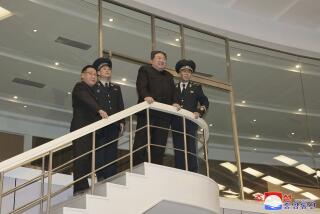Cellphones catching on in North Korea
- Share via
SEOUL — Amid the vegetable vendors and lightly stocked department stores, there’s a new high-tech shop in low-tech Pyongyang, North Korea, selling a hot gadget the rest of the world already takes for granted.
Cellphones.
Egyptian telecom company Orascom Communication launched a mobile network in the North Korean capital called Koryolink in December, on a long shot that its service can succeed in one of the world’s poorest and most reclusive states.
“This is not just about providing 3G mobile services; we are making history in a country that is developing and opening up in a remarkable way,” Orascom Telecom Chief Executive Naguib Sawiris said in the news release.
Since February, Orascom has reportedly sold 6,500 cellphones in North Korea. Television footage has shown crowds of North Koreans packed into the Koryolink mobile phone shop and service center in Pyongyang after prices were cut by half in mid-February.
Nevertheless, in impoverished North Korea, which in 2007 had an average per capita income of $1,150, a cellphone costing about $300 is a luxury item as elusive as a diamond ring, several defectors said.
Many customers are government officials or the handful of wealthy residents who provide the Stalinist regime with hard cash from overseas, they added.
“The monthly pay of the mobile phone subscription is much higher than the monthly salary of the average citizen. Given the circumstance that food is not well supplied to people today, the starving would never think about buying a cellphone,” said Son Jung-hun, who worked at the state-owned trading firm in Pyongyang before defecting to South Korea in 2002.
There are other drawbacks. Forget about international or even long distance calls. Most North Koreans are restricted to phone use within their own villages -- whether they use a land line or a cellphone.
“It is even tough to have a phone at home. And what is worse is that you cannot call outside your town due to latest restriction on data flow from the government,” said Hyun In-ae, a former philosophy professor who escaped North Korea in 2004.
Defectors doubted the veracity of video clips showing people lining up to get a cellphone, saying the images were probably propaganda stunts staged by the North Korean government.
Analysts say North Korea intends to use the cellphone network as another means of monitoring its citizens. Cellphones are more “for management of the regime than any service for the public,” said Koh Yu-hwan, a professor of North Korean studies at Dongguk University in South Korea.
Under the terms of the joint-venture deal, Orascom, with a 75% stake, will invest $400 million in infrastructure and license fees over the first three years to develop the network.
Analysts have questioned the government’s motives in bringing cellphone service to the country. Some say Pyongyang has begun a more aggressive move to modernize its ailing economy as a way to attract foreign investment.
Experts say the regime is torn between modernization and controlling its people.
“In an attempt to make a great leap forward, the government has seized upon the promotion of information technology as a strategic priority,” Marcus Noland, a senior fellow at the Peterson Institute for International Economics, wrote in a recent paper on the Orascom deal.
But he noted “multiple false starts” in the nation’s cellphone strategy because of concerns over control.
The Orascom deal marks the second coming of cellphone technology to North Korea.
In 2003, a similar network was installed in Pyongyang and other cities, but a year later the government suspended all wireless access after a mysterious bomb explosion at a railway station killed 160 people and wounded 1,300 others.
Some believe the bomb was aimed at North Korean leader Kim Jong Il and possibly was triggered by a cellphone. Others believe the blast was sparked by a train laden with oil and chemicals that hit power lines.
But even after wireless access was suspended, some North Koreans managed to make secret cellphone calls, often using networks in adjacent China. And North Korean defectors in South Korea say they have often contacted relatives back home via cellphones.
--
Ju-min Park is with The Times’ Seoul Bureau.
More to Read
Sign up for Essential California
The most important California stories and recommendations in your inbox every morning.
You may occasionally receive promotional content from the Los Angeles Times.










